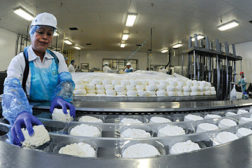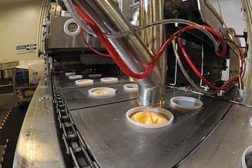Home » cheese processing
Articles Tagged with ''cheese processing''
The case for fortifying cheese
Overall, Americans do not suffer from nutrition deficiencies. But cheesemakers might find opportunities in niche markets. Certain bioactive peptides have potential benefits. They are worth watching.
August 8, 2014
Ingredients
Ingredia introduces milk proteins for fresh dairy products and solutions for cheese processors
January 24, 2014
WCIC show preview: Cheesemakers head to the land of cheese
Show organizers expect 1,400 attendees at the Wisconsin Cheese Industry Conference in La Crosse, Wis., April 17 to 18 to see the latest in cheese technology.
March 17, 2013
Trends in cheese flavors, manufacturing
An exclusive Dairy Foods survey uncovers the trends in cheesemaking, flavors, packaging, processing and equipment purchasing.
March 16, 2013
Bel Brands' Wisconsin pride: A look inside the cheese plant
Bel Brands’ recently FSSC 22000 certified manufacturing facility in Little Chute, Wis., produces cold-pack and gourmet cheese spreads, including WisPride, Kaukauna, Boursin and Merkts.
March 8, 2013
Stay ahead of the curve. Unlock a dose of cutting-edge insights.
Receive our premium content directly to your inbox.
SIGN-UP TODAYCopyright ©2025. All Rights Reserved BNP Media.
Design, CMS, Hosting & Web Development :: ePublishing











